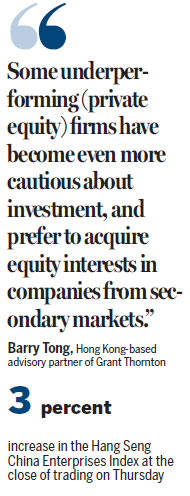Private equity firms hit snags with IPOs
Updated: 2016-02-19 09:16
By Luo Weiteng in Hong Kong(HK Edition)
|
|||||||||
Following the sustained equity market volatility and global economic turmoil, it's likely that initial public offerings (IPOs) will remain largely out of bounds for private equity (PE) firms in the near future, leaving secondary buyouts an increasingly preferred exit rout for PE sellers, says assurance, tax and advisory firm Grant Thornton.
Traditionally, an IPO exit stands as one of the favorable options for PE firms. Funds raised through Hong Kong share sales had seen a 56-percent jump from HK$166 billion in 2013 to HK$259 billion last year.
Last year, Hong Kong reclaimed its ranking as world's largest market for IPOs for the first time since 2011, leaving New York and Shanghai a distant second and third. As the SAR retained the top spot for IPOs in 2015, PricewaterhouseCoopers believes that funds raised in Hong Kong could continue rising to HK$300 billion.
Although total funds raised in Hong Kong's IPO market have been going up steadily in the past few years, the number of IPOs, however, saw a significant drop from 104 in 2013 to 87 last year, according to Grant Thornton.
Such a decline was very much due to the mainland's economic slowdown, plummeting oil prices, uncertainties in the US Federal Reserve's timetable for interest-rate hikes and the euro zone's weak overall performance, said Barry Tong, Hong Kong-based advisory partner of Grant Thornton.
As global economies began on a subdued note this year, an IPO exit, subject to comparatively higher risks, much longer duration not less than 6 months and higher costs, will see secondary buyouts gradually becoming an alternative exit strategy for PE firms which are under pressure to return capital back to their investors, said Tong.
"Some underperforming PE firms have become even more cautious about investment, and prefer to acquire equity interests in companies from secondary markets because other sizable PE funds have already conducted due diligence of such companies, enabling them to minimize risks," he said.
With the support of the central government, Tong believes that investment in startups will become a driving force for the development of Hong Kong- and mainland-based PE firms.
Cases in point include the mainland's CSC Venture Capital, which poured $400 million into AngelList - a US crowdfunding website for early-stage startups - in October last year, and mainland private equity firm AFC (Hong Kong) Investments, which was reported last year to be planning to allocate up to $20 million for investment in startups and agricultural firms in Malaysia.
The Hang Seng China Enterprises Index surged 3 percent to close at 8,166.47 on Thursday.
sophia@chinadailyhk.com

(HK Edition 02/19/2016 page9)